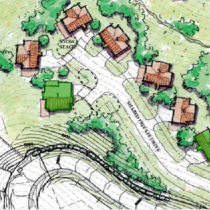Landscape Architecture for Landscape Architects › Forums › GENERAL DISCUSSION › Who is going to take your place when you retire?
- This topic has 1 reply, 15 voices, and was last updated 15 years, 2 months ago by
Anonymous.
-
AuthorPosts
-
December 5, 2010 at 7:23 pm #166566
 earthworkerParticipant
earthworkerParticipantYou are right about the consolidation of firms. We are seeing that our industry is not strong enough to stand on its own merit. We need the architects and civil engineers. Let’s face it. They give us the work. Just ask EDAW. They were the foremost leader of landscape architecture in the world. Even they realized they could not survive without help. Hence, the buyout by AECOM. In Denver, AECOM closed the existing downtown Denver EDAW offices and forced them to set up shop in AECOM’s offices outside the metro area.
As for the business model not working, it’s obvious many of the young kids who have not worked in office have no clue how billing and payments are processed in a firm. Firms don’t get paid the instant they drop off a set of cd’s. Most firms have a 60 to 90 day invoice time frame. It may take weeks or months to receive payment for work done. In the meantime, they still have to pay bills, make payroll, rent, etc. A firm I worked for even took out microloans every month to make payroll and then paid the bank back once clients paid up.December 5, 2010 at 11:26 pm #166565Anonymous
InactiveJonathan
If you can, I wouldn’t totally give up on your entrepreneurial pursuits though. I’ll bet you’ve already learned a lot about business being a contractor.
You already have the right attitude, which I think is the most important thing.
My intention isn’t to discourage anyone from taking the big leap, because there is a certain amount of comfort in taking charge of your own destiny. Yes, it’s scary sometimes, but at least you won’t have to worry about when the next round of layoffs will arrive. At least with your own business you’ll have multiple sources of revenue instead of depending on one almighty boss.
Although, I have a couple of decades in the business, I’m still learning. And I probably have a few more mistakes of my own to learn from.
That being said, do what you have to do to make through this downturn. Don’t listen to the gloom-ers. The sun will shine again.
December 6, 2010 at 12:00 am #166564Anonymous
InactiveAndrew
I agree with you 100%.
But I will add that sometimes firms will stop looking for new business or not be as aggressive in pursuing it when they have a lot work on their books. The best firms make it a point of always keeping a steady flow of new work to reduce the rollercoaster affect of having to hire and fire employees.
I think instead of not looking for new work when you’re busy, maybe that’s the time to be more selective in the projects you go after. If a project is so big that it requires a firm to quickly double its staff, maybe that’s not the right project to pursue. There’s definatly a cost for bringing on new staff, purchasing work stations (as you touched on), training them, etc. and then laying them off.
December 6, 2010 at 12:51 am #166563Anonymous
Inactive“We need the architects and civil engineers. Let’s face it. They give us the work.”
Architect and Civils are not the only sources for work for us. There are developers, homeowners, municipalities, builders, churches and more probably a few more that I can’t think of right now.
Besides, what’s so bad about marketing ourselves to Architects for work? MEPs, Interior Designers, Structural Engineers, and Cost Estimators do it, and yes Civil Engineers do it as well. It’s just business who cares where the check comes from as long as it’s good. Nobody’s going to give us anything or help us to survive as a profession. We have to do it ourselves by proving that we LAs bring something special to the table and that we provide value to a project.
We are a relatively new profession and we are still trying to define ourselves, while Architects and Civils have the advantage of being around for centuries. Let’s head into the future by being brave and bold and stop looking at ourselves as the ugly stepchild.
December 6, 2010 at 6:57 pm #166562mark foster
ParticipantNice thread about “firm sustainability”
Interesting that few of the replies mention the market, or should I say the markets– Government, institutional, commercial, land development, residential to name a few. A firm’s type of market should have a lot to do with it’s character, abilities, size, and sales efforts.
My firm is a residential/commercial mix and we need a large number of clients. One crucial key to our longevity (apart from client referrals) is symbiotic relationships with other companies which are allied to us but not competitors–especially the ones which are in front of our prospective clients on a daily basis: landscape designers, builders, renovators, engineers, architects, interior designers, venders, contractors,etc.
If you have a disciplined approach (be good at a core of things–don’t try to do everything that walks through the door), these relationships can be a perennial source of new clientel, as well as portals into new markets.. In a sense, they become an unpaid sales force for you, just as you are for them.
December 6, 2010 at 7:52 pm #166561Tanya Olson
ParticipantHow about this idea? Find a Landscape Architect that you look up to, or like their work or their firm size and ask if they will take some time to mentor you. That way instead of looking for a job, you can keep your firm open, develop some professional relationships and get some advice. Even if you have to drive a couple of hours and pay for lunch once a month it could really mean a lot in the long run.
I have yet to meet a LA who wasn’t willing to give their advice when asked – (I mean you got 6 PAGES of replies to your ‘rant’)!December 8, 2010 at 8:12 pm #166560 BoilerplaterParticipant
BoilerplaterParticipantPlusses of the coffeeshop model, as I see it:
Personal autonomy, flexible schedule
No more office politics, unless you have multiple-personality disorder.
You can get back at the big firms by undercutting them, since your expenses are so much lower, hastening their demise.
Working from home, no commute, hence lower cost of living, lower carbon footprint, more time with family.
You may not be able to go after larger projects, though the co-op idea could provide staff for such work.Downsides:
The risk is all on you.
Incurring office expenses PC, software, etc.
You have to be the one to go out and find work.
You still may face competition in some respects from India.
You might miss the camraderie of an office. I know I do.
Problem with newly-minted landscape architects not being able to get experience when everyone is a solo flyer.Thoughts?
December 8, 2010 at 10:05 pm #166559Tanya Olson
ParticipantExactly my experience.
Another thing is that it (the coffee shop model) forces you to pay attention to what you want your business model to be – what you want your practice to look like. You have to pay taxes, keep receipts, look for write offs, etc. I prefer the hands-on of doing this all myself and enjoy understanding every aspect of practice.
Because of your lower overhead, you get to spend more time designing and limited management time – mostly spent doing the aforementioned, networking, etc. Yes you have to find your own work, but you get to keep more of your income, which means its easier to make a living than the giant firms require – which in turn could mean that there is more work to go around for everyone = kind of back to the artisanal model of Olmsted’s day.Yes, it can be a little lonely especially in those dark gloomy hours of February and March (ok – lonely enough to seriously think about therapy, just so you have someone to talk to ! haha) and you really do have to be purposeful about seeking new input and ideas.
Love the idea of the co-op, Russell. Check out the Dreamfish Cooperative in SF. What would keep a co-op from forming a team to take on a large project in competition with larger firms? I think it could be really interesting to include allied professions as well!
December 9, 2010 at 2:38 am #166558 Andrew Garulay, RLAParticipant
Andrew Garulay, RLAParticipantI don’t see the “coffee shop” model taking over. It is always individual freelance landscape architects, small regional firms, big national/international firms , and multi-discipline office staff. In different economic circumstances you have a higher percentage of this one or that, but you always have all of them because there is always a need for all of them.
There have always been consolidation cycles and spin off cycles. Some is caused by us responding to the market and some is caused by us getting whacked by the market.
December 9, 2010 at 3:51 am #166557Anonymous
InactiveExcellent point.
-
AuthorPosts
- You must be logged in to reply to this topic.


